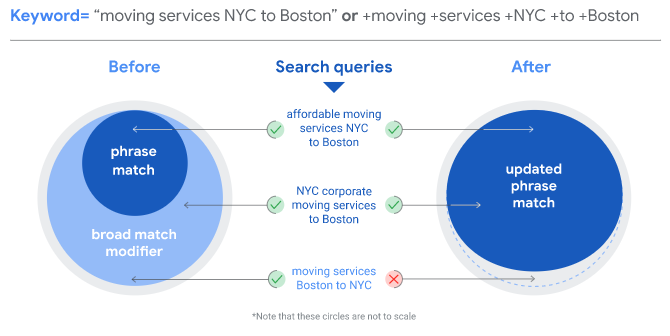Google Ads Keyword Match Types Have Changed. Here’s What You Should Do.
Ever since Google used the phrase “don’t be evil” as its motto and in its corporate code of conduct, people have been using the phrase to judge every action they take as evil or not. With the latest change to their advertising platform, people are asking themselves again – is Google being evil? Some think so, and some think not.
The change in question is the announcement that they’re phasing out Broad Match Modified (BMM) keywords and changing how Phrase Match keywords function. By July 2021, you will no longer be able to create Broad Match Modifier terms. You will have to use Broad, Phrase or Exact Match…just like the olden days before BMM.
What’s different than the olden days though is those match types don’t work how they used to. And as of February 18th, Phrase Match started to basically (not exactly) work like Broad Match Modifier. Some are calling it “Updated Phrase Match“or “Broader Phrase Match.”
What happened
Here’s how Google described what’s happening…
Phrase match will expand to cover additional broad match modifier traffic, while continuing to respect word order when it’s important to the meaning.
The image below is Google’s example of how things will change…
As you can see, “Broader” Phrase Match will cover almost everything that BMM covered, with the exception of queries where Google’s AI thinks the word order matters to what the searcher is looking for. In the case above, moving from NYC to Boston is totally different than the opposite of moving from Boston to NYC. So as long as the Ads system thinks the query is about moving from NYC to Boston, it will be eligible to show your ad.
A query will also be eligible if the Ads system deems the word order not to matter. For example, chicken dinner recipes and dinner recipes chicken mean essentially the same thing, so both would be eligible.
Why BMM was created in the first place
Originally, Google created BMM as an unofficial match type because informed advertisers wouldn’t use Broad Match. Although Google positioned Broad Match as the match type that would boost conversions by going out and matching your ads to relevant queries that you haven’t added to your account yet, it was WAY too broad in what was considered relevant. The boost to conversions wasn’t worth the increase in wasted click costs for most campaigns.
Google understood that, so they gave advertisers a way to control the broad-ness of Broad Match by allowing them to put plusses in front of specific words in their Broad Match keyword that absolutely had to be in the query. They figured this would encourage informed advertisers to expand their targeting beyond Phrase and Exact match to relevant queries those match types wouldn’t cover.
Advertisers jumped on this, but not in the way Google intended. Instead of just putting plusses in front of the essential words, most advertisers put them in front of EVERY word. This gave the highest level of control by restricting query matching to only those that had every word of the keyword in the query, regardless of word order. Informed advertisers still didn’t trust the system.
BMM was a great solution. Advertisers had all the options they needed to decide for themselves how conservative or aggressive they wanted to be with keyword matching.
So why the switch back?
A couple of reasons…
- Google is claiming that the broad-ness of Broad Match isn’t as broad as it used to be. They’re saying their system has improved to truly only match Broad Match keywords with queries that have a fairly similar meaning.
- Google has loosened their matching rules on Phrase and Exact Match. Essentially, there is little that separates BMM from Phrase Match anymore because again, Google is saying their ability to decipher similar meaning between keywords and the queries they match them to has drastically improved. So instead of having 2 match types that do essentially the same thing, they are saying they’re simplifying account management by using 1 match type instead.
What it means for you
It means…
- If you used BMM to put plusses in front of some words and not others, you’ll lose that more aggressive approach to gaining additional traffic. You will have to go full Broad Match.
- You’ll see traffic increase on Phrase Match keywords and decrease on BMM keywords. But remember, as is shown in Google’s example above, Phrase Match will likely cover almost all of the previous BMM queries, but not all of them.
- You’ll likely see more duplicate search terms and irrelevant search terms if you use both match types. When you have duplicate search terms matching to different ad groups throughout an account, you don’t get a consolidated view of the search term. This can cause you to come to wrong conclusions with ad testing and bidding on keywords, ad groups and campaigns. With Phrase Match expanding its reach, you’ll likely see some new irrelevant search terms start to appear in your reports.
What to do about it
Here are some of the things you may want or not want to do about this change right now…
- Because the two match types have started behaving the same way, you don’t need to migrate your BMM keywords to Phrase Match. Google is saying that additional tools will be rolled out for easier conversion in the future if you want to have consistent match types across an account. If traffic decreased too much and you want to get some of it back, you’ll have to use Broad Match.
- Be checking your search terms report for any newly poor matches to your Phrase Match keywords. Add them as negative keywords.
- Monitor n-grams to analyze how new and different words and phrases perform. You may want to segment search term themes to be able to treat them differently; or exclude them altogether. Maybe phrases with “buy” in them perform better than phrases without.
- Monitor budgets if you segment campaigns by match type. This change may affect where ad spend goes. With BMM essentially behaving as a phrase keyword, there can be cases where an identical BMM and phrase keyword are matching to the same search.
- Review Google’s keyword recommendations. If the change causes you to lose traffic, you may want to consider new keywords you might add to expand your reach. Also, if you have duplicate keywords, they will surface here for you to take care of.
- Test Broad Match. With Google saying Broad Match is now less broad, you could use a limited budget to discover new keyword opportunities you might not be targeting yet.
Arguments for and against the change
As I said earlier, some are supporting the change and some aren’t. Optmyzr’s Frederick Vallaeys points out…
There is no such thing as a bad keyword, only bad bids. The idea is that advertisers shouldn’t care what queries their ads are shown for, so long as they get clicks at a price that makes sense considering the likely conversion rates and sales per click. Advertisers want business growth; they want profits. Nobody truly cares about keywords. Smart Bidding takes care of this by setting a profitable bid for any query, no matter how weird.
Sounds good in theory. But how well will the Google Ads system be able to pull this off in your particular account? It definitely still depends on factors like click volume, conversion volume, semantic understanding by the system, and others. You can’t just set it and forget it. We humans must still work with and understand how to use the machines appropriately to deliver the best results in each situation.
Others like Matt Van Wagner spoke to Search Engine Land and said…
Google controls the economics of the auction with its quality score and ranking calculations — if it controls everything, it can just sort of turn a dial and profitability goes up. And so I do think that Google is getting closer and closer to that point and by pushing less control and more machine automation, that means they’re choosing who wins auctions — it’s a rigged game.
Ultimately, whether this change seems advantageous or not, it’s going to happen. Start to prepare each account appropriately and monitor how it affects performance so that you can make the right adjustments and keep driving profitability.



